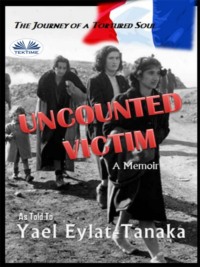
Полная версия
Uncounted Victim
As mentioned earlier, my father’s brother, Raphael, lived with our family in Valence, along with his wife, Allegra, and their son, Sami. Sami was an only child, and he practically grew up with us and used to call my brother, René, his frère-cousin (brother-cousin). My grandmother, Memé, adored him, it was said, because he was the child of her favorite son. She also favored my brother, René, because he was the family’s first born. René was a very good child, quiet and serious and hard-working, with a gift for music. I admired him very much and would memorize whatever lessons I heard him recite when doing his homework. I had a good memory and this was good preparation for my own classes later on; but while I was a good student, I was also a rebel. I would rather play with my dolls than do anything else! Once, René and I were charged with knitting a sweater, each knitting one-half of it; by the time René had finished his half, the two sleeves and the collar, I was still struggling with the front. The ribbing was fierce, yet he was so good at it, and I was too lazy and only wanted to play. Also, I was unruly and impertinent, talking back to my parents. I must have been quite a handful! I felt unloved, particularly when compared unfavorably to my older brother who could do no wrong. In retrospect, I realize that I have always felt very close to him and always loved him very much. I suppose I learned to love him by imitation! This deep love has remained with me all my life. Evidently, whatever we learn as children molds us and colors our personalities forever. There has been no sibling rivalry between the two of us, as I do not remember feeling any jealousy toward him, and I believe the deep love and profound affinity between us have kept me from being resentful in spite of my parents’ and grandmother’s attitude toward me and their constant praise of my brother.
When René was nine years old, he was enrolled at the music school. All my pleas to be enrolled too came to naught: I was a girl and was not allowed to do things that boys did. René excelled in this, too, and soon started learning to play the clarinet and eventually joined the Valence Orchestra as clarinetist. A school friend of mine who attended the same music school told me in admiration that my brother was “hors concours,” meaning beyond rating and raves. I loved him and basked in his glory, and was happy turning the pages of his music when he played his clarinet at home. Our apartment was always full of his music, either when he was practicing his scales or playing pieces like Rimsky-Korsakoff’s Shéhérazade, or von Soupé’s Cavalérie Légère or Le Marché Persan. Nowadays, whenever I hear Weber’s Clarinet Concerto or Mozart’s Clarinet Concerto, I am again that little girl turning the pages for her beloved brother. How I loved and admired him! I still do, of course, in spite of all the years, all the changes, all the distancing and coming close again – he is and always will be my anchor, the brother I look up to, the brother I loved because he was everything I was not: quiet and serious, good and beloved, and I ebullient, playful, rebellious … and unloved. Did the fact that he was so loved make him so sure of himself and lovable, or was he loved because he was lovable in the first place? I suspect the former, and believe that to love a child is the greatest gift parents can impart on him or her, and that is the root of self-worth and self-confidence.
I went to an all-girls’ school. The boys’ school was separated by the nursery school, and I remember how I wondered at age eleven or twelve, why the older school girls found the boys so interesting. Once, before classes began, I was told that my brother, René, had been run over by a car. I ran out of the courtyard and saw him lying in the street, a crowd surrounding him. I could not help crying upon seeing him outstretched on the pavement and in pain. Much later, I identified that pain when I read a letter from the French poet, Madam de Sévigne to her ailing daughter, saying, “J’ai mal a votre gorge …” (your throat hurts me …)
I loved school. I enjoyed learning and must have been a bright child because I skipped the second grade. Being a star pupil made me the teacher’s pet in most of my classes. However, my friends and I were in dread of the principal. Mademoiselle Herbet was an extremely severe unmarried woman who was a holy terror to all of us girls. What a surprise she was for me, though! I came to love Mademoiselle Herbet and I am sure she loved me. I could read her affection and approval in her eyes, and she even invited me to her apartment to have tea with her after school. Her apartment was located on the second floor of the school, and we tip-toed with awe when we passed her door on our way to classes. I recall that one day she called on me in class and asked that I recite our lesson for that day. In great shame, and after a long silence, I admitted to her that I had not studied the lesson. She responded, “Too bad, you can sit down. I am giving you a zero.” That zero was a terrible mark on my record, and I felt quite humiliated. Mademoiselle Herbet called on some other pupils, and listening to them, I was able to memorize the geometry theorems that I had not studied the night before. I whispered to my friends that I knew the lesson now, and in great excitement they told the teacher that I could recite it now. Mademoiselle Herbet called on me again, and I recited the theorems without error, to the uproar acclaim of the entire class who begged her to lift the awful zero. She did to my great relief. What a victory that was!
****
During one of my recent trips to France, I went to see my elementary school along the Rhône. Nothing had changed. I could even smell the chalk! With tears in my eyes, I remembered my innocent childhood gone by. I wanted to run and tell my parents that I was home again and had seen my school … but of course, they were nowhere to be found; gone with my childhood and the best part of my life. I wanted so much to tell them all I had seen and experienced, how the streets that looked so large as a child were now so narrow. I wanted to tell them that I was back at the beautiful park where Maman used to take us three children, that I had seen our old friends who were still living in their apartment on the next street, and that they had not changed at all. They told me that Martine, my friend, was now a nurse and living in Germany. I wanted so much to share with them all this nostalgia … but of course, I could not. I felt as if I had lost them again and experienced my grief anew. I stopped at the boulangerie where we bought our bread and cakes and found it exactly as I remembered it, with the same aromas, the same variety of breads warm from the oven, but it was not the same.
It is true that one can never go back …
The games we would play as children … Some mornings, my father would call us from his bed inquiring whether we were awake. If we were, he would say, “Parlons de lit à lit” (Let’s talk from bed to bed). We would start chatting, eventually joining him in his bed, but I always waited for him to tell us stories about “l’Italie,” imaging sunny vistas, but he would correct me and remind me that we were talking “de lit à lit,” an alliteration.
And I had my dolls. A particularly beloved one had her carriage that I had furnished with pillows and blankets. One day while playing with this doll, I realized that my mother had gone out shopping and left me at home with my grandmother who was forever cursing me, and I began crying in despair at the prospect that my mother might never return. I still remember the pain I felt and the fear of never seeing her again.
My grandmother had an incomprehensible hatred toward me. She would often curse me, and my mother would not dare defend me. My father, her son, would not dare offend her by standing up to her. For example, she was very handy with her fingers, and was always doing some needlework. I asked her once to show me how to make the heel of some stockings, and she answered, “Learn by yourself as I have!” Innocently, wishing to ingratiate myself, I said, “But you are an accomplished housewife,” which was a compliment in those days. Her response was, “May you never reach the day of being an accomplished housewife!” I ran to tell my mother who was so shocked, she sent me to ask my father what this meant. He asked me where I heard that, and when I told him that Memé had said that to me, he became pale, but did nothing. She knew that she could do or say anything and no one would ever oppose her.
Another time she said, “Que te quedaras en la cuna!” (You should have died in your cradle). No wonder I was in fear of being abandoned by my mother into the hands of such a harpy!
At about that time, when I was around ten or eleven, our school distributed some kinds of shoes or clogs to children in need. The principal of the boys’ school was in charge of the program, and when I presented myself to him to receive the clogs, he touched me in an inappropriate way. I was so ashamed that I did not say a thing to anyone.
Then a grocer in the next street where my mother used to send us shopping did the same thing in broad daylight. This time I told my mother, and both she and my father went to confront him, but he denied it.
Later, I was hospitalized at Granges Blanches in Lyon, and a young intern touched me inappropriately while he was examining me. Again, I told my parents who made a big to-do, but he again denied everything.
Years later in Italy, a priest hugged me in his office and inserted his hands under my blouse. I reported him to the bishop, but the priest denied it, of course.
In those days, women’s voices did not have as much weight as they do today, although even these days, they seem to have tall fences to climb.
Throughout my life, the men over me took advantage of their rank with their remarks or behaviors, and the only thing I could do was leave if I did not wish to tolerate that treatment. I always worked for the president or senior partner of a firm, and unfortunately, there was no one above these men to whom I could complain, and they seemed to exploit that situation. The only time I reported it was to the unemployment office who called me and my boss to a hearing, but as I was new in the United States and not yet fluent in English, I was penalized by the unemployment office for having “lied.”
To be sure, the old ways of doing things shock the modern generations. Spanking children used to be common place, and for the most part, nobody died. But that is not the type of abuse I’m talking about. I refer here to taking advantage of those who cannot defend themselves for one reason or another, either because of their youthful age or their gender; their culture or physical strength.
Indeed, abuse of the weaker by the stronger has always existed, and it is only now that women and children have begun to expose it, and the media has become more sensitive to exploring such unsavory stories.
Abuse has taken many forms through the ages and across cultures, from stoning to driving spikes through wrists and ankles for presumed blasphemy, drawing and quartering for high treason or incinerating people. All such atrocities deserve their own obituary, a prayer and resolve that they should never be allowed to be repeated.
As awful as that butchery was, every bit of suffering inflicted on any helpless creature, should be considered despicable and reprehensible.
When I was nine or ten years old, I had my tonsils and adenoids out. At that time, this operation was done without anesthesia. I have never understood why the adults in charge thought it was all right to submit a child to such suffering simply because the child was helpless, either because of its age, or because it was rendered so by the application of restraints. Didn’t those adults have memories of their own childhood to think back to? Was it that the operation was presumably so quick that it would be just like tearing off a Band-Aid, and the child would soon forget about it? Here I am writing about it all these many years later, still painfully traumatized by the experience.
I was rolled into a folded sheet the length of my entire body, like a sausage, and a nurse held me on her knees and held my head back so that the surgeon could get inside my mouth. My screams didn’t matter; in fact, they helped him get the mouth gag in, and in an avalanche of incredible burning pain from which I thought I would die, the surgeon worked inside my mouth. I don’t remember how I breathed through the blood and his fingers and that damned gag and the nurse forcing my head back. Believe me, it was not a quick stripping off of a Band-Aid.
My daughter suffered a similar fate, but fortunately she was given ether. However, to hear her tell the story, the very act of being tightly restrained on the lap of the surgical attendant with her head forced back, unable to cooperate and participate in her own care, was devastating to her. She feels traumatized to this day by that experience of a procedure which to so many otherwise wise adults is nothing more than a temporary discomfort.
At another time, while at camp, my friends and I ate too many plums along with their pits which led me to have an attack of appendicitis. Our usual surgeon was away, so an old doctor operated on me and botched the operation. The following day he had to reopen the wound to clean out an infection in my stomach, but this time he went in without anesthesia. You can still hear my screams in New York City!
We grew up. René joined the Boy Scouts, and I was allowed to join the Girl Scouts.
Chapter 2
Germany Invades France
I was 12 years old and living with my family in Bourg-les-Valence when World War II began in September of 1939. I heard the adults speaking of Neville Chamberlain, then British Prime Minister, who had gone to Germany to try and convince Hitler to be less fanatical in his politics of annexation (he had already annexed Austria and the Sunderland in Czechoslovakia. We had anticipated war after Hitler’s rise in Germany, when he finally took Danzig in Poland on September 1, 1939 (now called Gdansk). There had been international appeals and conferences to avert that catastrophe, with Neville Chamberlain returning with his slogan, “Peace in our times” by which he seemed to appease Hitler and the world. In France, we sang patriotic songs before the war challenging Hitler to come to the Maginot Line, a line of defense built along the border with Germany, but leaving the Belgian border undefended and through which the German hordes eventually invaded France. But, in the span of ten months, French forces were beaten and defeated and overrun by the German army that crossed the Maginot Line.
Whatever peace had been agreed to between France and Germany lasted just a few months, and in 1940 the French army capitulated and the German armies invaded France. The very nationalistic French media kept singing popular songs, taunting Hitler and defying him to come to the Maginot Line, a fortified bunker built between France and Germany and meant to stop the invading German armies. Instead, Hitler’s armies bypassed the front and the Maginot Line, instead crossing undefended Belgium and making their way to Paris.
One day, Rene’s best friend came to our home pale and haggard, and told us that an armistice had been asked by Maréchal Pétain and that France had lost the war. The French government had left Paris and taken refuge in Vichy, and the German forces had invaded France.
The French government retired to Vichy in the center of France under the direction of old Maréchal Pétain and Prime Minister Pierre Laval. Both of them were considered collaborators by the French population because the Vichy government was very accommodating to the occupying German army that imposed all kinds of restrictions on the French. Together with the government, two military academies, St. Cyr and Le Prytanée Militaire, left the occupied zone and installed themselves in military barracks that had been vacated by the French soldiers sent to the front. All the available food had been requisitioned by the Germans and we started having butcher shops selling horse meat which, by the way, was very tasty.
The first German orders were that every Jew in the occupied zone had to wear a yellow Star of David on their clothing. The Jews had a curfew and even though we lived in an unoccupied zone, we kept hearing that some of the French population helped the Germans arrest Jews during the night. These poor people were never heard from again.
We also learned from those who were successful in bypassing the Demarcation Line that thousands of Parisian Jews, including children, were rounded up and dropped at the Paris Velodrome d’Hiver and “forgotten” there. Those who survived the cold and exposure were taken to Auschwitz.
We lived in constant fear. We were bombarded by the allies’ planes that were trying to destroy the two French military barracks in our neighborhood, and we feared being awakened during the night to be deported, betrayed by our own compatriots.
We were hungry. Our rations included a single 200- gram piece of bread per day. Of course, we had no eggs, flour, butter, sugar or chocolate. Only horse meat was available, but that also soon disappeared from the shops, being diverted to the occupying troops.
One of the first orders imposed by the German army was a ban on any nationalistic expressions of patriotic songs or military parades in the city. The 14th of July being France’s Bastille Day, everyone was in suspense anxiously anticipating what the cadets in our city would do considering the Germans’ ban. How would they celebrate France’s Independence Day?
On the 14th of July 1940, all the cadets from St. Cyr and Le Prytanée military academies, donning their best uniforms, flaunted their disdain and paraded on the city’s boulevards where the German Commandantur had its headquarters. They sang patriotic songs, such as,
Vous avez eu l’Alsace et la Lorraine
Mais malgré tout nous resterons Français
Vous avez eu l’Alsace et la Lorraine
Mais notre coeur vous ne l’aurez jamais.
You got Alsace and Lorraine
But nevertheless we’ll remain French
You got Alsace and Lorraine
But our hearts you’ll never get.
Amazingly, there were no fearsome reprisals or punishments aside from forbidding the cadets from leaving their barracks for a month. There was great joy, as the reprisals could have been extremely severe.
Among the people who succeeded in crossing the demarcation line, one of them stands out in my mind: He was a Hungarian Jew, Mr. Spitzer, who had been living in Paris and was now trying to survive in the unoccupied zone.
He worked as a “plongeur” (dish washer) at a restaurant and used to come to our home for some companionship. In his broken French he told us that one day, as he was coming home from work, he saw his wife and children being taken away in a truck by the Germans. He knew that he was helpless and couldn’t do anything to save them. I was crying and I remember my father saying “Tu vois, tu as fait pleurer my fille.” (You see, you made my daughter cry).
His was hardly an isolated story in those days. We all feared for our lives. We all feared deportation, and worse.
Конец ознакомительного фрагмента.
Текст предоставлен ООО «ЛитРес».
Прочитайте эту книгу целиком, купив полную легальную версию на ЛитРес.
Безопасно оплатить книгу можно банковской картой Visa, MasterCard, Maestro, со счета мобильного телефона, с платежного терминала, в салоне МТС или Связной, через PayPal, WebMoney, Яндекс.Деньги, QIWI Кошелек, бонусными картами или другим удобным Вам способом.








